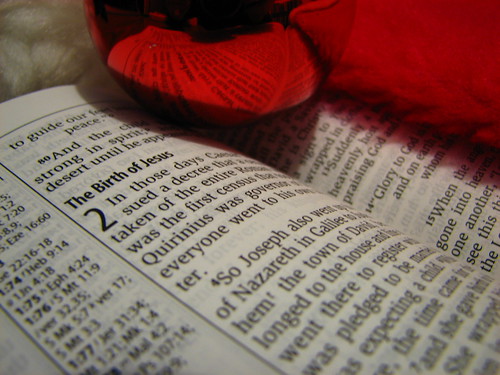
Karl Barth brought the interpretation of the Decalogue into the 20th century. Dr George Hunsinger from Princeton Theological Seminary brought Barth’s views to Wheaton College in the last lecture of the conference.
Barth did not discuss the Decalogue any specific, systematic, or comprehensive way in his writings or lectures. Is this indicative of the place the Decalogue had in the 20th century? However, Barth did present a lecture titled “First Commandment as Theological Axiom,” which provided much of the content for Hunsinger’s own analysis of Barth’s Decalogue.
Barth introduced a number of metaphors to establish his theological framework and communicate his ideas. Dr Hunsinger presented three of them: the Sphere, Trinitarian logic, and
Alphebung (sp? [ed. update:
aufhebung]). The sphere, I gathered, was Hunsinger’s expansion of Barth’s metaphor of a circle. This circle put Christ at the center. Each arc along the circumference of the circle represents a different manifestation of Christ in the world. Of these, the Decalogue is one.
The metaphor of Trinitarian logic gets lost in my notes. I cannot accurately represent it, and in lieu of presenting a false understanding, I’ll leave it, like the Trinity itself, a mystery to us all.
The final metaphor, which I can’t even spell—it being a German word for which Dr Hunsinger finds no sufficient English equivalent—was a math metaphor as far as I could tell. Barth seems to have an affinity for such metaphors. (In my fruitless Google search for details about Trinitarian logic and
aufhebung [ed. corrected], I found another metaphor using a line tangent to a circle, the intersection of which is Christ….yeah….) The metaphor of the
aufhebung [ed. corrected]
nature would be represented this way: -(-(+)). Okay, let’s break it down. First is the positive, (+), of which the Incarnation is one example. Next, we negate the positive, -(+), which would be Jesus’ Crucifixion. Finally, we negate the negation, -(-(+)), which is what the Resurrection did. Does that blow your mind or what? Another example would be grace, (+), then judgment, -(+), then transformation -(-(+)).
In his lecture on the first commandment, Barth asked two questions: “What did the first commandment prohibit?” and “What did it require and allow?” The fact that the first command was revealed gave it, for Barth, precedence over Natural Theology. So, Natural Theology had to be reexamined in light of the absolute claims of this revelation.
Further, Barth believed that the term “axiom” was also subject to these absolute claims. Thus, the word “axiom” had to be dismantled, reassembled, and sanctified to fit theology. Barth’s “conversionist” stance, to use Niebuhr’s categories, is apparent in this belief. The first commandment, then, was not an axiom, but “axiom” itself was premised upon the first commandment.
Thus, Barth’s conclusion in his lecture was that Scripture, having precedent as revelation, is the norm of norms. All else must be interpreted through Scripture (i.e., revelation, Christ).
This is a strong, absolutist conclusion to my sensibilities. I like it. Barth’s conclusion was somewhat of a reaction, by my estimation. His circle metaphor, which placed Christ at the center, stood in contrast to an elipse (similar to an oval), which had not one center but two. These two foci could be nature and grace (Brunner), or it could be systematics alongside Christ. These sorts of dual-center approaches, Barth argued, pervaded Roman Catholicism, modern liberal theology, and NeoProtestantism. In this light, Barth’s views seem to elevate Christ and center upon him in ways that other perspectives fail to do. It also speaks of the economy by which Barth was determining value, one which placed Christ as God before all.
After Dr Hunsinger developed Barth’s circle metaphor into a sphere, he expanded it again to include concentric spheres, or spheres within spheres, with Christ still at the center. Using this expansion, he discussed the various secondary and tertiary levels (theoretically, there are more) that Barth identified. Barth spoke of the first commandment as secondary revelation. He called Scripture secondary and dependant on Christ. A sermon was tertiary (third) to Scripture and Christ.
In all, Barth’s Decalogue seems to be built on these ideas. Much of the discussion throughout the history of interpretation seems discontinued in Barth. Discussion of Natural Law is upended in a restructuring of thought wherein Christ precedes it and defines it, rather than the other way around. But even this restructuring answers the question of what the relationship is between the two.
As for his analysis of what the functions of the Law are and how the believer might use the Decalogue, these issues seem to be absent. It seems, perhaps, that Barth was more concerned with dismantling, reassembling, and sanctifying theological thought than he was in working it out its implications. The work of doing that, it seems, may have been left to us.
 Last night I made a trip to a new Barnes and Noble that just opened up. As we drove up I told my friend, "It's like walking into the Coliseum," it was so big. The cashier I talked to said it's the biggest in Illinois. I'll say.
Last night I made a trip to a new Barnes and Noble that just opened up. As we drove up I told my friend, "It's like walking into the Coliseum," it was so big. The cashier I talked to said it's the biggest in Illinois. I'll say.









 If you’ve been a regular reader of Watching Gravity for a while now, bless you. You probably already know then that I have a strange fixation with
If you’ve been a regular reader of Watching Gravity for a while now, bless you. You probably already know then that I have a strange fixation with 






